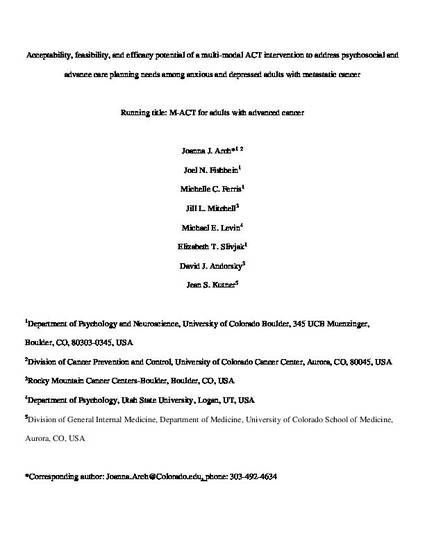
Background: Adults with metastatic cancer frequently report anxiety and depression symptoms, which may impact health behaviors such as advance care planning (ACP).
Objective: The study leveraged acceptance and commitment therapy (ACT), an evidence-based approach for reducing distress and improving health behaviors, and adapted it into a multimodal intervention (M-ACT) designed to address the psychosocial and ACP needs of anxious and depressed adults with metastatic cancer. The study evaluated M-ACT's acceptability, feasibility, and efficacy potential.
Design: The study was designed as a single-arm intervention development and pilot trial.
Setting/Subjects: The trial enrolled 35 anxious or depressed adults with stage IV cancer in community oncology clinics, with a referred-to-enrolled rate of 69% and eligible-to-enrolled rate of 95%.
Measurements: M-ACT alternated four in-person group sessions with three self-paced online sessions. Acceptability and feasibility were assessed through enrollment, attendance, and satisfaction ratings. Outcomes and theorized intervention mechanisms were evaluated at baseline, midintervention, postintervention, and two-month follow-up.
Results: Participant feedback was used to refine the intervention. Of participants starting the intervention, 92% completed, reporting high satisfaction. One-quarter did not begin M-ACT due to health declines, moving, or death. Completers showed significant reductions in anxiety, depression, and fear of dying and increases in ACP and sense of life meaning. In this pilot, M-ACT showed no significant impact on pain interference. Increases in two of three mechanism measures predicted improvement on 80% of significant outcomes.
Conclusions: The M-ACT intervention is feasible, acceptable, and shows potential for efficacy in community oncology settings; a randomized trial is warranted.
